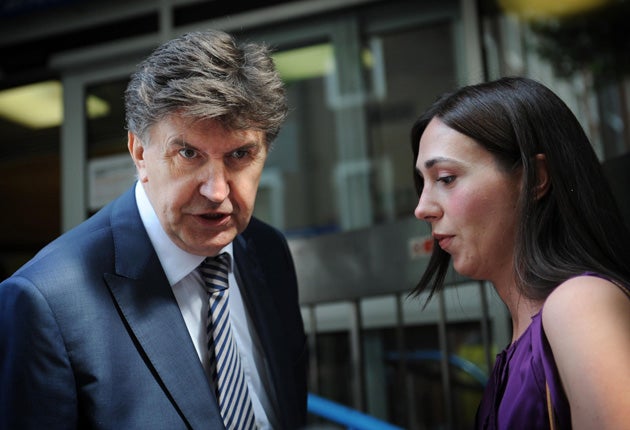Horrors of Bosnian War relived in British court

An engineering professor masterminded a series of war crimes, including ordering the execution of wounded Yugoslav soldiers, when he briefly became President of Bosnia at the outbreak of war 18 years ago, a court in London heard yesterday.
Ejup Ganic, 65, was arrested at Heathrow in March this year on an arrest warrant issued by the Serbian authorities which he and his family claim is a politically-motivated attempt by Belgrade to rewrite the history of the Bosnian War which broke out in 1992, eventually claiming more than 10,000 lives.
British prosecutors representing the Serbian government yesterday outlined evidence that Dr Ganic, a friend of Baroness Thatcher, "personally commanded" a succession of atrocities in the Bosnian capital, Sarajevo, when for 48 hours he became the country's President on 2 and 3 May 1992.
The chaotic events which presaged the bloody dissolution of the former Yugoslavia were resurrected nearly two decades later in a courtroom at the City of Westminster magistrates' court as lawyers outlined the case as to why Dr Ganic should be returned to Belgrade to face charges of "grave breaches" of the Geneva Convention. Dr Ganic denies all the allegations.
The academic, who was a senior member of the Bosnian presidency in Sarajevo at the outbreak of war, was appointed the country's temporary leader when the incumbent, Alija Izetbegovic, was taken hostage by Serb-dominated Yugoslav federal army (JNA) forces.
The crisis led to clashes between JNA troops and Bosnian forces in Sarajevo during which, according to prosecutors, Dr Ganic ordered attacks on a JNA officers' club, a hospital and a convoy of ambulances, leading to the execution of troops who had surrendered.
The skirmishes came to a head on the evening of 3 May when a United Nations convoy, organised to resolve the hostage crisis by exchanging Mr Izetbegovic for a senior JNA general and his troops, was fired upon by Bosnian forces while retreating from a barracks in central Sarajevo, killing a large number of Serb soldiers, some of them already wounded.
James Lewis QC, representing the Serbian authorities, told the court that the order for this and four other alleged atrocities came directly from Dr Ganic and the Bosnian high command.
He said: "It is alleged that Dr Ganic agreed with others to carry out a course of conduct which would necessarily mean the commission of war crimes."
Arguing that the Serb arrest warrant was backed by reliable evidence, Mr Lewis added: "This is not a trumped-up charge. It is a matter which needs to be adjudicated upon before a proper tribunal. So intimidating were these attacks, so high profile were they, that they cannot have taken place without authorisation at the very highest level."
Court documents stated that the claimed atrocities began at around 11am on 2 May when Bosnian troops attacked an officers' club, leading to the capture of catering staff who were later tortured and executed.
A JNA medical convoy sent to retrieve the injured from that attack was then fired upon with machine guns and rockets, destroying two ambulances before 11 soldiers with their arms held up in surrender were picked off, the court heard.
One witness said the surrendering soldiers were killed or wounded by opponents "carrying out a liquidation as if they were at the firing range".
Prosecutors said that in the following 24 hours a military hospital was attacked by sniper fire and grenades before the order to carry out the assault on the retreating JNA column was given from a room in the Bosnian presidency in which Dr Ganic was present.
Dr Ganic, who runs a private university in Sarajevo and was a regular visitor to Britain, was arrested after attending an academic ceremony at Buckingham University and spent 10 days in prison before his £300,000 bail surety was paid by Diana Jenkins, a Sarajevo-born socialite and the millionaire wife of a British banker.
Speaking outside the court, the academic, who was greeted by protesters waving banners reading "Ganic – blood on his hands" and "Gotcha Ganic", denied the allegations and said he could not hope to receive a fair trial in Belgrade.
He said: "They hope to rewrite history because this is a country that committed genocide. It is 18 years after these events and there were hundreds and hundreds of incidents of this kind.
"They are trying to say, 'We are an organised country that can give a fair trial'. Just imagine – it is as if the Germans were prosecuting those who led the resistance against them."
The case before Chief District Judge Timothy Workman continues.
Join our commenting forum
Join thought-provoking conversations, follow other Independent readers and see their replies
Comments
Bookmark popover
Removed from bookmarks